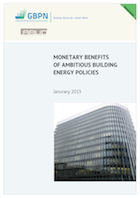Monetary Benefits of Ambitious Building Energy Policies
Mainstreaming high-performance buildings could deliver a 124% return on investment globally through building-related energy cost savings by 2050 says a new comprehensive assessment study of the costs and benefits of low energy building pathways published by the GBPN.
![[Report] Monetary Benefits of Ambitious Building Energy Policies-GBPN](https://gbpn.org/wp-content/uploads/2015/01/Report-Monetary-Benefits-of-Ambitious-Building-Energy-Policies-GBPN.png)
 Mainstreaming high-performance buildings could deliver a 124% return on investment globally through building-related energy cost savings by 2050 says a new comprehensive assessment study of the costs and benefits of low energy building pathways published by the GBPN in cooperation with the Central European University’s Center for Climate Change and Sustainable Energy Policy (3CSEP) and Advanced Building and Urban Design (ABUD).
Mainstreaming high-performance buildings could deliver a 124% return on investment globally through building-related energy cost savings by 2050 says a new comprehensive assessment study of the costs and benefits of low energy building pathways published by the GBPN in cooperation with the Central European University’s Center for Climate Change and Sustainable Energy Policy (3CSEP) and Advanced Building and Urban Design (ABUD).